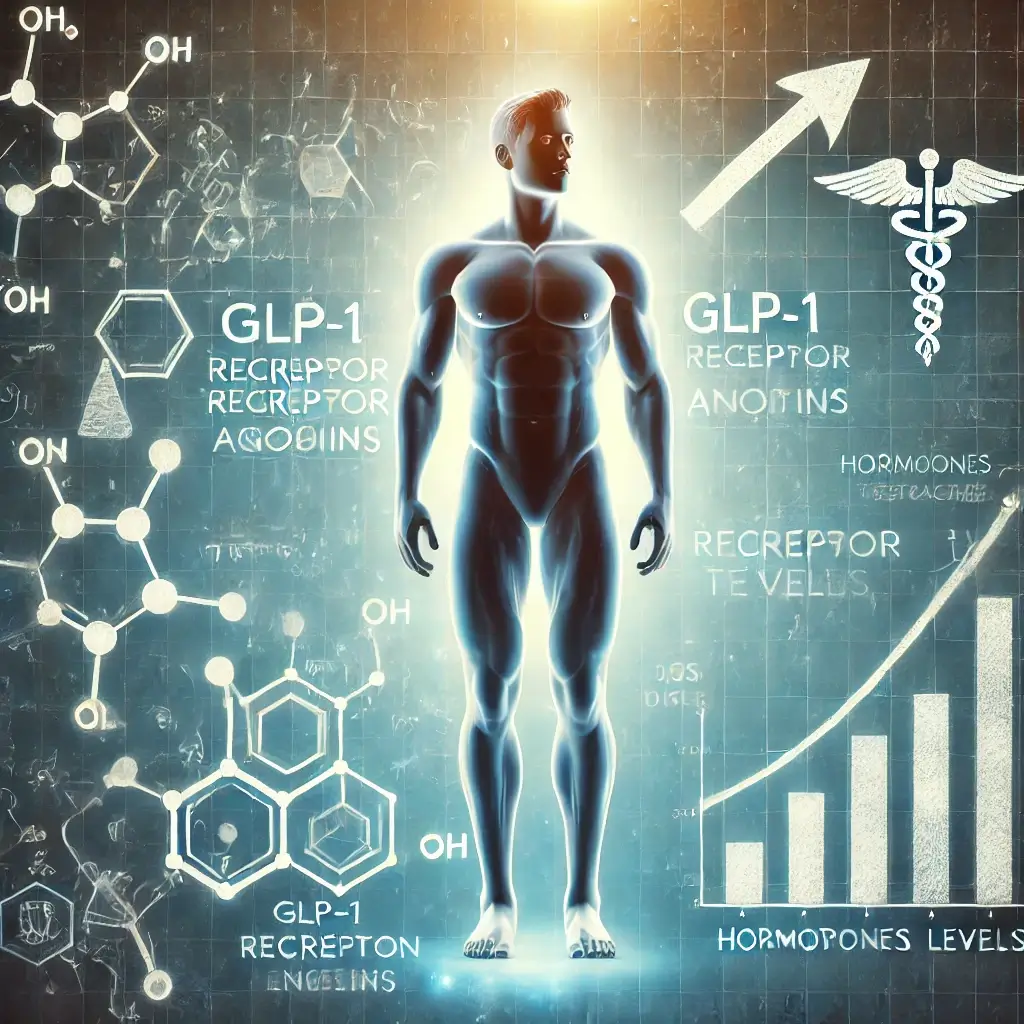The Complex Relationship Between GLP-1 and Testosterone
The link between GLP-1 receptor agonists (GLP-1 RAs), often known as GLP-1 for weight loss, and testosterone levels is somewhat complex. Here’s a breakdown of what studies suggest:
Potential Benefits: Weight Loss and Testosterone
There is evidence that weight loss can boost testosterone levels in obese individuals. GLP-1 RAs are effective weight loss drugs; therefore, they may indirectly contribute to increasing testosterone levels by reducing body weight.
Research Insights: GLP-1 RAs and Testosterone
Numerous studies have examined the possible effects of glucagon-like peptide-1 receptor agonists (GLP-1 RAs), such as liraglutide, on testosterone levels in males with obesity-related hypogonadism. Hypogonadism is a disorder characterized by low testosterone levels that is commonly found in obese people.
Promising Evidence: GLP-1 RAs and Testosterone Synthesis
Existing evidence suggests that GLP-1 receptor agonists may directly affect testosterone synthesis and metabolism in this population. Several studies found that individuals with obesity-associated hypogonadism who were treated with GLP-1 RAs had higher testosterone levels than those who were given a placebo (an inactive drug).
Exploring Mechanisms: How GLP-1 RAs Affect Testosterone
The suggested mechanisms by which GLP-1 RAs may affect testosterone levels are unknown. However, researchers have found numerous possible paths. One theory is that GLP-1 RAs promote the pituitary gland’s luteinizing hormone (LH) secretion, enhancing testosterone synthesis in the testes.
Direct Impact on Testicular Cells
Furthermore, GLP-1 receptor agonists may directly affect testicular Leydig cells, which are the primary testosterone makers.
Addressing Underlying Causes: Insulin Sensitivity and Inflammation
Furthermore, some research suggests that GLP-1 receptor agonists may enhance insulin sensitivity and reduce inflammation linked to obesity-related hypogonadism. By addressing these underlying causes, GLP-1 RAs may indirectly aid in restoring normal testosterone levels in individuals with this problem.
The Need for Further Research
It is important to note that the current evidence on the relationship between GLP-1 RAs and testosterone levels in men with obesity-associated hypogonadism is limited. More extensive research is required to fully understand the underlying mechanisms and confirm the clinical implications of these findings.
Promising Therapeutic Implications
Nonetheless, the recent investigations offer encouraging insights into GLP-1 RAs’ potential therapeutic implications in treating obesity-related hypogonadism.
Uncertainties and Considerations
Limited Data: There has been little research into the direct effect of GLP-1 RAs on testosterone levels in non-obese individuals or men without hypogonadism. More research is needed to get definitive results.
Focus on Weight Loss: The Primary Benefit
The principal advantage of GLP-1 RAs on testosterone levels is expected to be weight loss. These drugs do not provide direct testosterone replacement therapy.
The Uncertain Mechanism
The precise mechanism by which GLP-1 RAs may alter testosterone levels in some situations is poorly understood. More study is required to explain this.
Consult Your Doctor Before Using GLP-1 RAs
If you’re concerned about low testosterone and want to try GLP-1 RAs for weight loss, talk to your doctor first. They can examine your condition and determine whether GLP-1 RAs are a good weight loss strategy.
Alternative Testosterone Management Options
Suppose weight loss is not your major concern, and you have been diagnosed with low testosterone. In that case, your doctor may offer alternate treatments to correct hormonal imbalances, such as testosterone replacement therapy (TRT).
The Importance of Professional Medical Advice
Remember that seeing a doctor is essential for knowing your unique condition and devising a targeted treatment plan to address any hormonal difficulties you may have. They can propose the best action based on your weight, testosterone levels, symptoms, and overall health.
